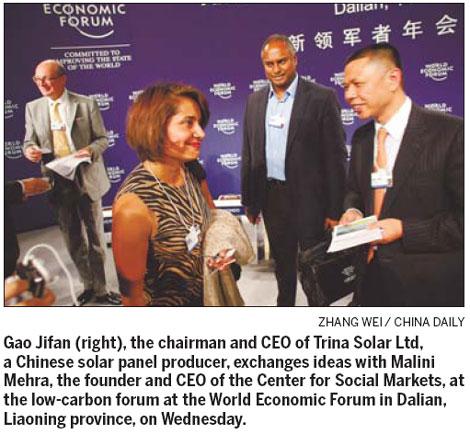
DALIAN, Liaoning - Government incentives are important to pave a low-carbon road for economic growth, and the corporate sector should be the main player through technological improvement, said officials and industry insiders at the World Economic Forum in Dalian.
"The most important thing is to have the right direction," said Gao Jifan, chairman and CEO of Trina Solar Ltd, a solar panel manufacturer in China.
According to Gao, new energy solutions, such as solar power, provide the "right direction" for growth, although many deficiencies still exist. "As long as we have the direction correct, we can succeed at last. But this also requires policies, technologies and investment," he said.
Malini Mehra, the founder and CEO of the Center for Social Markets, a nonprofit organization that promotes sustainability, said that there are two ways for governments to support low-carbon businesses.
"The first is to provide some means of recognizing their good work," she said. The second is building a measuring system to "verify which company is actually doing good, not just talking about doing good".
Shocked by the massive earthquake and nuclear accident earlier this year, Japan is considering a diverse energy supply model that will no longer depend heavily on nuclear power to generate electricity, according to Japan's Vice-Minister of the Environment Shoichi Kondo.
Electricity generated by other low-carbon methods is expected to be integrated into the national grid, Kondo said, if the plan is approved by the Diet, Japan's parliament.
Also, Japan encourages energy-efficient appliances and heating systems by giving credits or discounts to purchasers.
Zero consumption
However, policies are only the foundation, said Gao. "We must have a good overall plan, along with advanced technologies, to bring value back to investors."
He has a vision that many of the world's households will have "zero-consumption" residences by about 2020, meaning they would get all their electricity through a self-contained, solar-powered generation and storage system.
Without limits of the grid, this type of technology can be used everywhere in the world, especially in less-developed areas.
"The cost of solar technology has been on the decline over the past few years because of policy incentives and innovations of companies around the world," Gao said.
The cost of a solar-power panel that can produce 1 watt of electricity was $4 in 2005, but it is only $1.2 to $1.3 now, he explained.
"This is the result of technological innovation and large-scale manufacturing. And it makes us more confident of seeing solar energy become a major part of the energy system in the future."
Being low-carbon also helps a company attract clients, and customers are more likely to choose low-carbon products, said Klaus Kleinfeld, CEO of the US aluminum product maker Alcoa Inc.
"The generation that we recruit today has a very different social consciousness and standards," he said. "They want to see and only want to work for companies that are sustainable."





